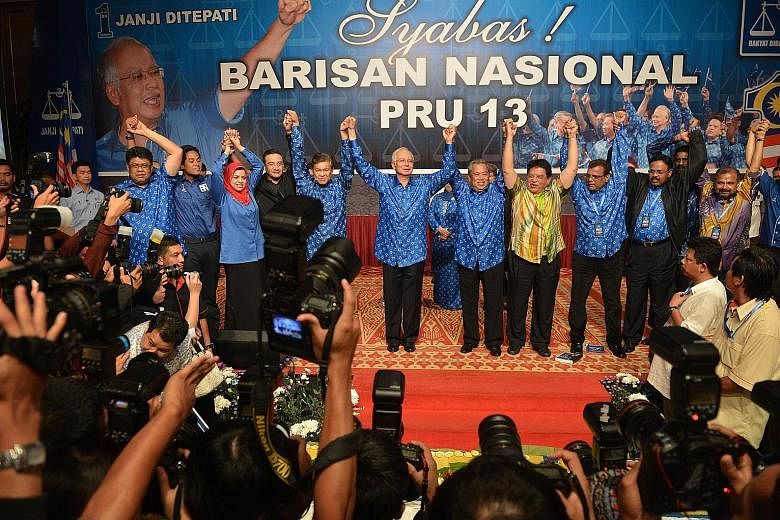Will Malaysia's general election be held in April or May next year? Or will it be held much later in October?
That is a question that only Prime Minister Najib Razak can answer.
He has started beating the drum for the polls, sending politicians and analysts scrambling in search of clues.
A quick way to predict likely election dates is by first eliminating the traditional no-go months in Malaysian politics.
Datuk Seri Najib would then only have the leftover months and weeks to choose from, say analysts and politicians.
-
Quick glance at past polls
-
2013
•Polling Day: May 5
•Campaign period: 15 days
•PM: Mr Najib Razak
2008
•Polling Day: March 8
•Campaign period: 13 days
•PM: Tun Abdullah Badawi
2004
•Polling Day: March 21
•Campaign period: 8 days
•PM: Mr Abdullah
1999
•Polling Day: Nov 29
•Campaign period: 9 days
•PM: Tun Dr Mahathir Mohamad
1995
•Polling Day: April 24 and 25
•Campaign period: 10 days
•PM: Dr Mahathir
In Malaysia, the general election has not been held during the fasting month, for example, or in the weeks after it, when the Malay Muslim majority celebrate the Hari Raya Aidilfitri festival.
Another period that is generally avoided is during the monsoon months at the end of the year, when many districts in the east coast states are flooded.
A quick glance at next year's calendar shows as many as seven months when PM Najib is unlikely to call for the polls.
These would be in January, February and March, and then also not in June or September, and not in November and December.
The clear slots to hold elections in the first half of next year are seen in April and May, before fasting starts on May 27, political watchers say.
While both former premier Mahathir Mohamad and Mr Najib have held by-elections during the fasting month, a full-blown general election has never been held in Malaysia during the holy Islamic month, when Muslims refrain from eating and drinking between dawn and dusk.
For the second half of the year, a window is available around late July to early August. But the period favoured by most analysts and politicians is the slot in October.
At the Umno annual assembly two weeks ago, Mr Najib said in Bahasa Malaysia that the general election will be called "tidak lama lagi" - literally meaning "not long more" or soon.
Plenty of excitement was generated by those words when he opened the assembly on Dec 1, especially after national news agency Bernama reported Mr Najib as saying that the nationwide polls "will come any time soon".
But an aide to a senior minister said the words meant that "polls would be held several months later and not in a few weeks' time".
The actual date is up to Mr Najib alone to pick, because in Malaysian politics, the Prime Minister has traditionally assumed the sole right to decide when to call the polls. The good news for him is that the opposition remains deeply divided.
Opposition Parti Islam SeMalaysia (PAS), now an ally of Mr Najib's Umno party, is likely to create three- cornered fights that will be detrimental to the other opposition parties.
It remains unclear how far the two new Malay-based parties will attract rural Malays, the backbone of Umno. Parti Pribumi Bersatu Malaysia is led by Tun Dr Mahathir, and Parti Amanah Negara by former leaders of PAS.
"Socially, Najib will continue stressing Malay unity and supremacy alongside the predominance of Islam," said Dr Mustafa Izzuddin, a fellow at ISEAS - Yusof Ishak Institute. "He will call for the elections when he believes the above twin emphasis has helped to consolidate the ground support of the Malays to win him the elections."
Like in the last two general elections, Chinese Malaysians who want more reforms and accountability from Mr Najib are widely expected to remain supporters of the opposition camp, though they will avoid Islamic party PAS.
Many political watchers expect Mr Najib to call the general election in October.
Malaysia will host the South-east Asia Games in August, where it aims to get many gold medals. The government will then celebrate the country's 60 years of independence on Aug 31, followed by Mr Najib presenting an early election Budget in October. The Budget is traditionally unveiled in the third week of October.
"Success in the SEA Games, big celebrations and Budget goodies; the narrative will be, if you want all these, vote us back in," said analyst Amir Fareed Rahim of KRA Group consultancy. The general election might then be held in late October and into early November, he said.
Still, despite the heated speculation, a key factor is Mr Najib's reputation as a cautious politician, making it possible that, like in 2013, the public could see months of on-again, off-again election guesswork.
Dr Wong Chin Huat, a fellow at think-tank Penang Institute, said: "Najib is not known to be decisive. If things are uncertain, he will delay and wait. He is not a risk-taker."
After all, time is on his side. PM Najib has until August 2018 to call for the polls.


